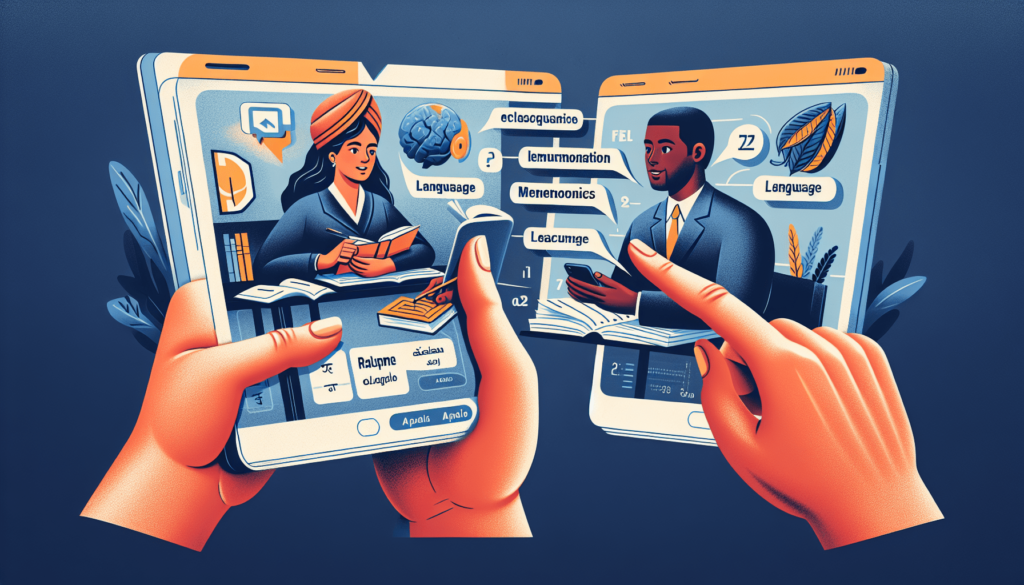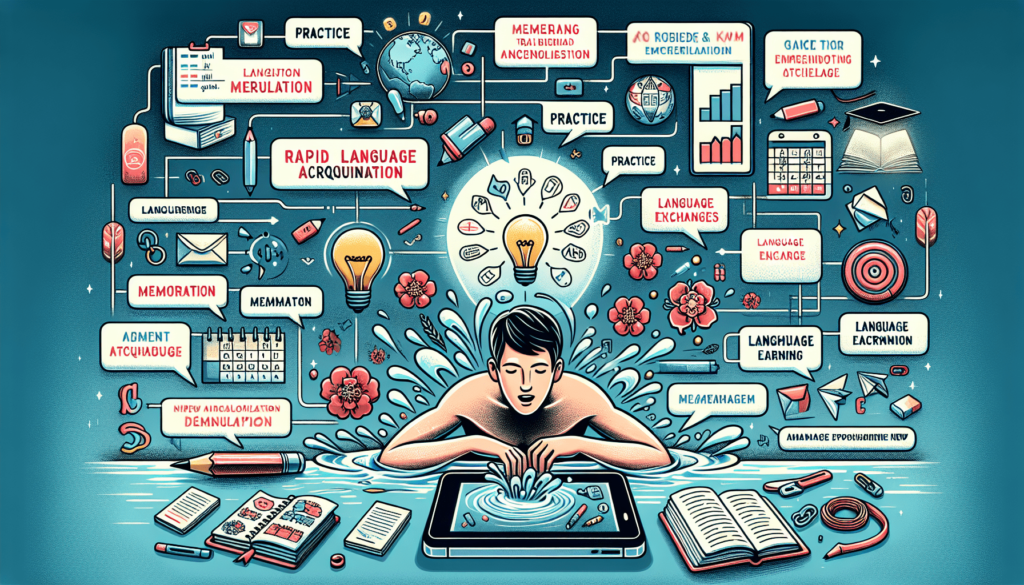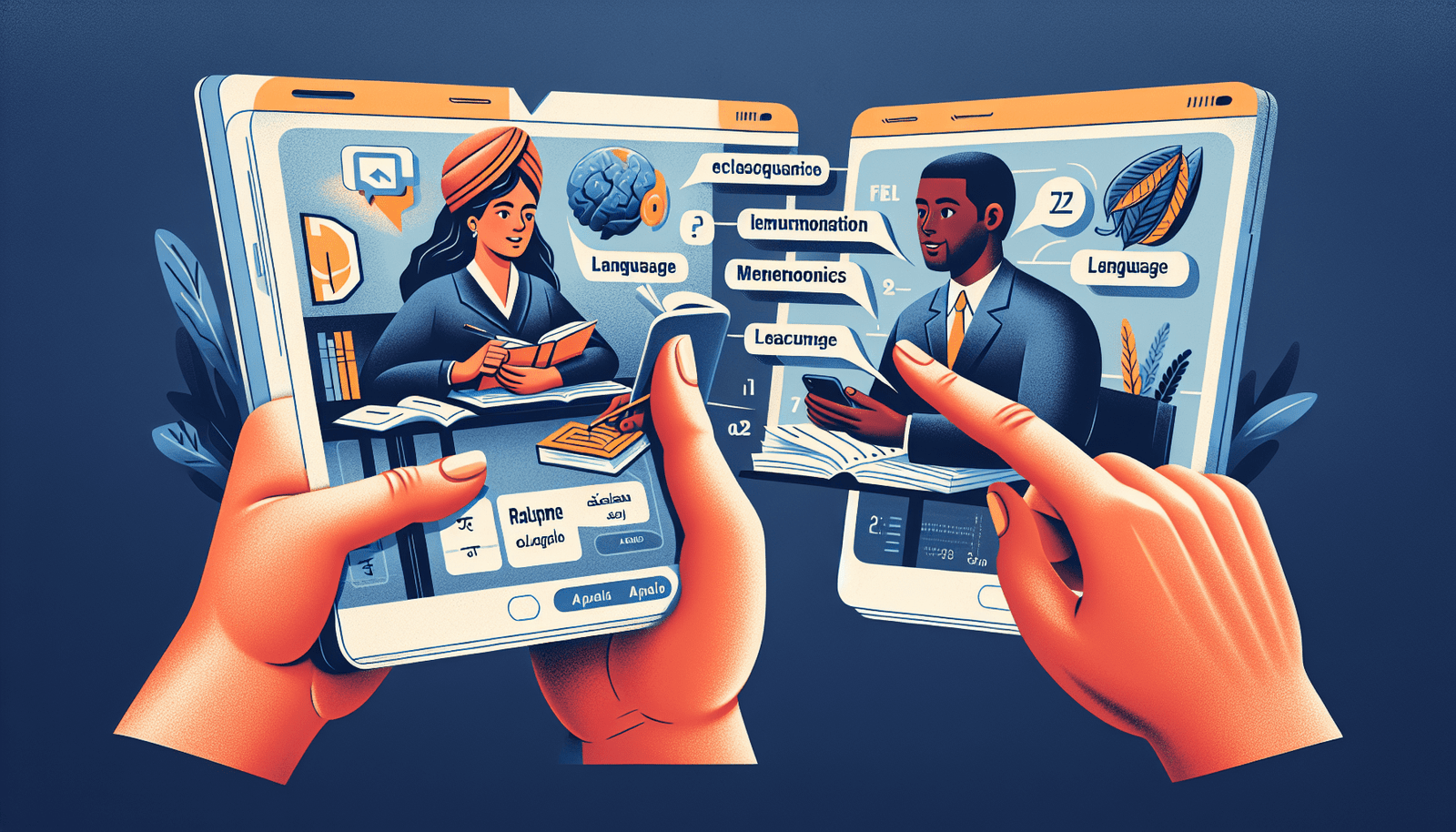Imagine being able to effortlessly communicate with people from all over the world, breaking down language barriers and opening up a world of possibilities. If you’ve ever dreamt of becoming fluent in a new language, you’re not alone. Learning a new language can be a challenging and time-consuming process, but with the right strategies, you can fast track your language learning journey. In this article, we will explore some of the best strategies for learning new languages quickly, empowering you to make progress in your language learning goals.

Immerse yourself in the language
Learning a new language can be a fun and rewarding experience, but it requires dedication and consistent effort. One of the most effective ways to learn a new language quickly is by immersing yourself in it. By surrounding yourself with the language, you will be able to pick up new words, phrases, and cultural nuances much faster. Here are some strategies to help you immerse yourself in the language:
Watch movies or TV shows in the language
Watching movies or TV shows in the language you are learning is an excellent way to improve your listening skills and familiarize yourself with the pronunciation and intonation of native speakers. Choose films or shows with subtitles in both the target language and your native language to help you understand the storyline while still exposing yourself to the new language. Pay attention to how the actors speak, their facial expressions, and gestures.
Listen to music or podcasts in the language
Listening to music or podcasts in the language you are learning can not only be enjoyable but also highly beneficial for your language acquisition. Music exposes you to colloquial expressions, idiomatic phrases, and the rhythm of the language, while podcasts provide you with informative and educational content. Look for songs or podcasts that interest you and listen to them regularly. Sing along to practice your pronunciation and rhythm.
Read books or articles in the language
Reading books or articles in the language you are learning helps improve your vocabulary, grammar, and reading comprehension. Start with beginner-level books or articles and gradually increase the difficulty as you progress. Look up unfamiliar words in a dictionary and try to understand the overall meaning of the text. Reading materials related to your interests or hobbies can also make the learning process more enjoyable.
Practice with native speakers
Connecting with native speakers is an invaluable opportunity to practice conversational skills and gain insights into the culture associated with the language you are learning. Seek out language exchange partners or conversation groups in your local community or online. Engaging in conversations with native speakers allows you to practice your speaking and listening skills, receive immediate feedback, and learn colloquial expressions and cultural nuances that may not be found in textbooks.
Set specific and achievable goals
Setting goals is essential to stay focused and motivated on your language learning journey. When setting goals, it is important to break down the language into smaller tasks to make the learning process more manageable. Here are some strategies to help you set specific and achievable goals:
Break down the language into smaller tasks
Learning a new language can be overwhelming if you do not break it down into smaller, more manageable tasks. Start by mastering the basics, such as greetings, introductions, and common phrases. Then, gradually expand your vocabulary and tackle more complex grammar structures. Breaking down the language into smaller tasks allows you to track your progress and prevents you from feeling overwhelmed.
Set a timeline for each task
Setting a timeline for each language learning task helps you create a sense of urgency and ensures that you stay on track. Determine how long you will spend on each task and set deadlines for yourself. For example, you might aim to learn 50 new vocabulary words within a week or master a particular grammar structure within a month. Setting deadlines helps maintain your motivation and gives you a clear roadmap for achieving your language learning goals.
Track your progress regularly
Tracking your progress is crucial for staying motivated and seeing how far you have come in your language learning journey. Keep a language learning journal or use a tracking app to record your achievements, milestones, and areas for improvement. Celebrate every milestone you reach, no matter how small. Reviewing your progress regularly allows you to identify areas where you need more practice and adjust your learning strategies accordingly.
Utilize language learning apps and software
In today’s digital age, there are numerous language learning apps and software available that can enhance your language learning experience. These tools offer interactive exercises, games, flashcards, and vocabulary lists to help you reinforce your language skills. Here are some tips for effectively utilizing language learning apps and software:
Choose a reputable language learning app
With countless language learning apps available, it is important to choose one that suits your learning style and offers quality content. Research and read reviews to find a reputable app that has clear explanations, engaging exercises, and a range of language resources. Some popular language learning apps include Duolingo, Babbel, and Rosetta Stone.
Engage in interactive exercises and games
Language learning apps often include interactive exercises and games that make the learning process more enjoyable and effective. Take advantage of these features to practice your listening, speaking, reading, and writing skills. Engaging in interactive exercises and games can help you retain new vocabulary, reinforce grammar rules, and improve your overall language proficiency.
Make use of flashcards and vocabulary lists
Flashcards and vocabulary lists are excellent tools for memorizing new words and phrases. Many language learning apps include built-in flashcard features or allow you to create your own personalized flashcards. Use flashcards regularly to review and test your knowledge of vocabulary and important phrases. Vocabulary lists, which are often organized by themes or topics, can help you expand your vocabulary and make your language learning more comprehensive.
Create a study schedule and stick to it
Consistency is key when it comes to language learning. Creating a study schedule and sticking to it helps you establish a productive routine and ensures that you dedicate regular time to language practice. Here are some strategies for creating an effective study schedule:
Allocate dedicated study time each day
To make progress in your language learning journey, it is important to allocate dedicated study time each day. Determine a time slot that works best for you, whether it is in the morning, afternoon, or evening, and make it a priority to study during that time. Consistency is key, so aim to study for at least 30 minutes to an hour every day.
Mix different language learning activities
To keep your language learning engaging and well-rounded, mix different learning activities in your study schedule. Incorporate activities such as reading, listening, writing, speaking, and practicing grammar exercises. Varying your activities helps prevent boredom and allows you to develop multiple language skills simultaneously.
Find a study environment that works for you
Creating a conducive study environment can greatly enhance your language learning experience. Find a quiet and comfortable space where you can focus and minimize distractions. Some people prefer studying in libraries or cafes, while others prefer the comfort of their own homes. Experiment with different environments to find what works best for you.

Practice speaking and listening regularly
Speaking and listening are two essential language skills that require regular practice. Actively engaging in conversations and immersing yourself in the language through listening activities are crucial for developing fluency and understanding. Here are some strategies to help you practice speaking and listening regularly:
Find language exchange partners or conversation groups
Connecting with native speakers or fellow language learners through language exchange partners or conversation groups can provide you with valuable opportunities to practice speaking and listening. Search for language exchange platforms or local conversation groups where you can engage in conversations with native speakers. Alternatively, you can find language exchange partners online and schedule regular speaking sessions via video calls.
Engage in language immersion experiences
If possible, immerse yourself in an environment where the target language is spoken. Travel to a country where the language is dominant or participate in language immersion programs. This immersive experience allows you to practice speaking and listening to native speakers in real-life situations, enhancing your language skills and cultural understanding.
Listen to podcasts or radio in the target language
Listening to podcasts or radio broadcasts in the target language exposes you to authentic, real-life conversations and helps develop your listening skills. Choose podcasts or radio shows that cover topics of interest to you, as this will keep you engaged and motivated to continue listening. Be sure to actively listen and try to understand the content as much as possible.
Repeat and imitate native speakers
To improve your pronunciation, rhythm, and intonation, it is important to repeat and imitate native speakers. Listen to audio recordings of native speakers and pay attention to their pronunciation. Repeat after them, mimicking their tone and intonation. This practice helps train your ear and mouth to produce the sounds of the language accurately.
Utilize language learning resources online
The internet offers a wealth of resources that can support your language learning journey. Take advantage of online language courses, forums, communities, and websites specifically designed for language learners. Here are some ways you can make use of language learning resources online:
Take advantage of online language courses
Online language courses provide structured lessons and comprehensive materials to support your language learning. Many reputable language learning platforms offer online courses that cover all aspects of language acquisition, including grammar, vocabulary, reading, writing, listening, and speaking. Enroll in online courses to gain a solid foundation and progress at your own pace.
Join language learning forums and communities
Language learning forums and communities are great places to connect with other learners, ask questions, and share resources. Join online forums or social media groups dedicated to language learning, where you can interact with fellow learners and native speakers. These communities can provide valuable support, encouragement, and language learning tips.
Access language learning websites and blogs
Numerous websites and blogs cater specifically to language learners. These platforms offer a wide range of resources, such as grammar explanations, vocabulary lists, practice exercises, and language learning tips. Find reputable language learning websites and blogs that suit your learning style and interests. Regularly visit these sites to access additional learning materials and expand your knowledge.
Use mnemonic devices and memory techniques
Learning a new language involves memorization, and mnemonic devices and memory techniques can significantly enhance your language retention. Here are some techniques you can use to aid your memory:
Create mnemonic stories or visual associations
Creating mnemonic stories or visual associations can help you remember new words or phrases easily. For example, you can imagine a vivid mental image that connects the sound or meaning of a word to its translation or definition. These creative associations make the learning process more engaging and memorable.
Use memory techniques like spaced repetition
Spaced repetition is a memory technique that involves reviewing learned material at increasing intervals over time. By spacing out your reviews, you reinforce your memory and improve long-term retention. Many language learning apps and flashcard programs utilize spaced repetition algorithms to optimize your learning experience.
Practice active recall and self-testing
Active recall and self-testing are effective methods to reinforce your memory. Instead of passively reviewing materials, actively try to recall and retrieve information from your memory. Test yourself by covering translations or meanings and try to recall them. Regular self-testing forces your brain to retrieve information, strengthening your memory.
Imitate native speakers and practice pronunciation
Mastering pronunciation is a crucial aspect of language learning. Immersing yourself in the language and imitating native speakers are effective strategies for improving your accent and overall pronunciation. Here’s how you can practice pronunciation:
Listen and mimic native speakers’ pronunciation
Listening to native speakers and mimicking their pronunciation is a powerful technique for improving your own pronunciation. Pay attention to how they articulate sounds, stress syllables, and link words together. Practice speaking aloud and imitate their pronunciation as closely as possible. Continual practice and feedback from native speakers can help you refine your accent.
Use language learning resources with audio components
Language learning resources that include audio components are invaluable for improving your pronunciation and listening skills. Choose resources such as audio-based courses, podcasts, or even online videos that provide audio examples. Regularly listen to and repeat after the audio, focusing on pronunciation accuracy and rhythm.
Record yourself and compare with native speakers
Recording yourself speaking in the target language and comparing it to audio recordings of native speakers can help you identify areas that require improvement. Pay attention to your pronunciation, intonation, and rhythm. Compare your recordings with those of native speakers and make adjustments accordingly. This self-reflection and comparison allow you to fine-tune your pronunciation skills.
Study grammar and vocabulary systematically
Grammar and vocabulary are the building blocks of language. To have a solid foundation, it is essential to study these aspects systematically. Here are some strategies to help you study grammar and vocabulary effectively:
Start with basic grammar rules and sentence structures
Begin by learning the basic grammar rules and sentence structures of the language. Start with simple verb conjugations, pronouns, and basic sentence patterns. Gradually increase the complexity of the grammar as you become more proficient. Solidifying your understanding of grammar fundamentals provides a strong framework for further language learning.
Build vocabulary through themed word lists
Expanding your vocabulary is essential for effective communication. Focus on thematic word lists related to your interests or daily life. Create flashcards or use language learning apps to practice and memorize new words. Review and reinforce vocabulary regularly to help your brain store the words in your long-term memory.
Use grammar exercises and quizzes
To reinforce your understanding of grammar rules and structures, practice with grammar exercises and quizzes. Many language learning resources provide worksheets, online exercises, or interactive quizzes to test your knowledge. Working on grammar exercises not only helps you retain the grammar rules but also improves your sentence construction and comprehension skills.
Stay motivated and make language learning enjoyable
Learning a new language can sometimes be challenging, but maintaining motivation and finding enjoyment in the process is crucial for success. Here are some tips to stay motivated and make language learning enjoyable:
Set rewards for achieving language learning milestones
Rewarding yourself for achieving language learning milestones can boost your motivation and give you something to look forward to. Set small rewards for each milestone, such as treating yourself to a favorite dessert or taking a break to watch a movie in the target language. These rewards provide positive reinforcement and make the learning journey more enjoyable.
Find topics or materials that interest you
Learning becomes much more enjoyable when you engage with topics or materials that genuinely interest you. Choose materials such as books, articles, podcasts, or movies that align with your hobbies, passions, or areas of curiosity. When you are interested in the content, you will naturally feel more motivated to learn and delve deeper into the language.
Celebrate your progress and achievements
It is important to celebrate your progress and achievements along the way. Recognize the effort you have put into learning the language and acknowledge every milestone you reach. Share your accomplishments with friends, family, or fellow language learners. Celebrating your progress provides a sense of accomplishment and encourages you to continue on your language learning journey.
In conclusion, learning a new language can be an exciting and fulfilling experience. By immersing yourself in the language, setting specific goals, utilizing language learning apps and resources, creating a study schedule, practicing speaking and listening regularly, employing mnemonic devices, imitating native speakers, studying grammar and vocabulary systematically, and staying motivated, you can accelerate your language learning journey and achieve fluency in no time. Embrace the process, be patient with yourself, and enjoy the adventure of acquiring a new language!

